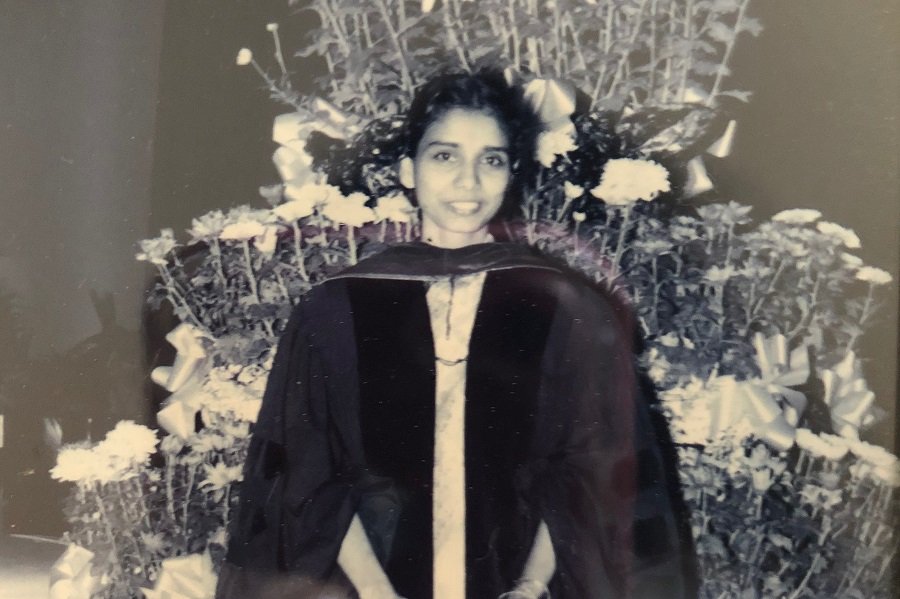In Conversation with alumna Pushpavati Paladugu

Alumna Pushpavati Paladugu is the first woman to earn a doctoral degree from the Department of Electrical and Computer Engineering. A pioneer in many ways, she earned her doctorate in solid state physics, graduating from the University of Minnesota in 1964 after which she went on to pursue research and teaching in various capacities.
We had the opportunity to have a conversation with her and learn about what inspired her to journey to the University from southern India more than 60 years ago, her experience as a student in ECE, and life after graduation.
Drive to learn
Paladugu credits her mother in particular for planting in her the seeds of curiosity and thirst for knowledge. At a time when education for girls was not prioritized, her mother was the driving force behind setting her on the path to higher education. Paladugu commenced formal education at the village school. When progress beyond elementary school was hindered by the lack of middle and high schools in the village, she asked her father to arrange for a tutor so she could prepare for a high school located in a town some distance away. After private lessons with a tutor for two years, Paladugu placed into the eighth grade. She eventually finished high school and went on to earn her undergraduate and graduate degrees. With a master’s degree in applied physics from Andhra University she began teaching physics at the college level. Three years into her teaching career, she made the acquaintance of a few students from the University of Minnesota. Conversations with them and her mentor, a strong advocate for women’s education, convinced Paladugu to apply to the University. She recalls mailing her application with no expectations, and when the letter of acceptance arrived, she was, in her own words, “shocked and delighted.”
When Paladugu turned in her resignation letter, the department head, knowing how difficult it was for women to have access to higher education let alone study overseas in pursuit of it, wished her success and said, “You are performing miracles!”
At the U
Paladugu was assigned to be advised by Professor Aldert van der Ziel, a pioneering researcher who explored the phenomenon of flicker noise in electronic devices. van der Ziel supervised almost 80 doctoral students and numerous master’s students, was a recipient of many prestigious awards, and was elected to the National Academy of Engineering in 1978. As a research assistant on his team Paladugu began work on thin films, but later switched over to research in theoretical physics. Her dissertation was on the theory of noise in field emission devices.
A successful student, Paladugu was a recipient of the John Cowles Foundation Fellowship. Reflecting on her student days at the U, Paladugu says she always found math and physics easy, but felt nervous around circuits-related topics. However, van der Ziel was very encouraging, and she credits her success in the program to him. A conversation with him that she recollects in particular took place just as she was about to enter a conference room for her oral defense. Calm and reassuring as always, he told her, “Remember, I am on your side.”
According to Paladugu, van der Ziel was a strong presence for his students. Keen on ensuring their success, he was supportive and nurturing of their academic and professional interests.
Life after graduation
When Paladugu received job offers from General Dynamics as well as Southern Illinois University (SIU), she turned to van der Ziel for advice based on which she chose to join SIU as a faculty member. She enjoyed her experience teaching at the university and engaging with her colleagues, department head, and dean. She taught for three years, but stepped away from academia after the birth of her first child. In the following years, even as she raised four children, she continued teaching, informally tutoring school children in math and physics.
Professor Pushpavati Paladugu’s story is remarkable in more ways than one. As the first woman to earn her doctoral degree from the department, who then went on to teach at Southern Illinois University, she did something that was rather uncommon for women at the time. Her work on noise in field emission devices and thin films has contributed to developments that we have seen in the area. Like her mother before her, she has instilled in her siblings, her children, and her grandchildren a love for learning. Even today, many years into retirement from formal teaching roles, she continues to coach her grandchildren in math and physics. Keenly aware of the support she received from family, friends, and mentors, she continues to encourage other students to reach high in their educational pursuits. The Paladugu J. Pushpavati Endowed Fellowship in Electrical Engineering established by Laura M. and Paladugu V. Rao (her brother) continues her contribution towards encouraging students to pursue their educational dreams in the area of electrical and computer engineering. Students who are faced with unique challenges might find the pursuit of knowledge to be an uphill battle; the Fellowship hopes to change that by financially supporting such students. We invite you to continue and strengthen the financial support established by the Paladugu fellowship.